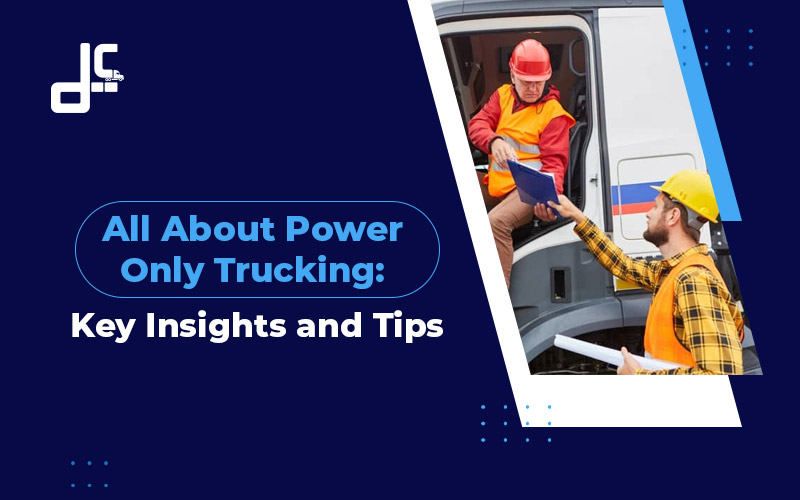Power only trucking has been a long-standing method that helps shippers meet their delivery dates while staying within budget. This method brings convenience and can help shippers move loads from point A to point B efficiently, making the transportation process smoother and more flexible.
By leveraging the power of power only trucking, you can ensure that your goods are transported without the need for owning or maintaining a truck. This not only reduces costs but also allows you to focus on other aspects of your business. Let us now know everything about power only trucking in detail.
What is Power Only Trucking?
A power only truck in logistics refers to a freight booking arrangement where a carrier provides only the power trucking unit and driver to haul a trailer provided by the shipper/freight broker. This load type is commonly offered on digital load boards. It gives carriers flexibility to haul various trailer configurations owned by different shippers.
For instance, a farmer may want to transport a harvester machine on a flatbed trailer longer than his own. He posts a power-truck load request specifying details of his trailer. Qualified drivers bid with their available dates. The winning trucker powers the farmer’s trailer, carrying the harvester from the farm to a dealership service center hundreds of miles away. Upon delivery, the driver disconnects the tractor unit while the trailer remains at the destination.
This allows the farmer and trucker to utilize each other’s assets for transporting oversized equipment within their towing capacities. Power only trucking loads hence facilitate specialized transportation needs of shippers.
Also Read – How Much Do Owner Operators Make
How Can Trucking Businesses Grow Using Power Only Trucks?
Trucking companies or carriers can profitably expand their business networks and revenues by leveraging their power only trucks. By focusing on availability for power only trucks, carriers can maximize asset utilization of their trailer-pulling tractors. This opens doors to a wide range of on-demand freight requests from shippers alongside conventional full-truckload bookings.
It also allows hauling more diverse cargo types that are otherwise inaccessible. There are a lot of advantages of offering a power-only trucking service. Let us see them in detail:
- Increased earnings through higher asset productivity and truck utilization.
- Opportunity to haul specialized freight types like oversize loads utilizing others’ trailers.
- Exposure to more significant marketplaces matching available power units to various trailer-pulling needs.
- Enhanced customer service by complementing full loads with power moves.
What are the Factors Determining the Pricing of Power-Truck Load?
There are many factors determining the pricing of power only loads. These include weather, length and height of haul, type of trailer, and your destination point of shipment. Let us go through them in detail:
- Weather Condition: Weather greatly influences pricing as hazardous conditions necessitate additional costs.
- Distance of Load: Loads hauled over longer distances require higher pay, given increased fuel usage and driving hours spent. More complex/specialized trailer types demand premium rates due to additional rig cooling/heating systems or livestock stabling amenities, which are expensive to operate and maintain.
- Location of Destination and Pickup Point: Remote origin and delivery points located in isolated or under-served regions affect pricing because they present logistical challenges.
- Urgency of Load: Time-critical/urgent loads with tight deadlines are adjusted upwards, accounting for the difficulty of expediting the shipment.
- Regularity Compliance: Liability/compliance considerations for hazardous materials also determine rates. Thorough situation evaluation allows determining profitable rates.
What are the Different Types of Trailers You Can Haul Using Power Only Trucks?
You can use many different types of trailers for power-only trucks. Let us look at various kind of types of trailers you can haul using Power Only trucking:
- Flatbed Trailers: Flatbed trailers are versatile and allow secure transport of machinery, farm equipment, modular buildings, and other oversized cargo.
- Refrigerated Trailers: Refrigerated trailers or reefers ensure temperature-controlled freight like pharmaceuticals and perishable food shipments remain at specified temperatures through specialized insulation and refrigeration units during transit.
- Open-top Trailers: Open-top trailers provide transportation of bulky loads that may not fit within enclosed trailers, like rolls of fabric and pipes.
- Specialized Trailers: Trailers like tankers haul liquid materials, whereas livestock trailers are equipped to handle animals.
- Container Haulers: Container haulers are fitted to securely transport ISO shipping containers for intra-continental and international cargo movement.
How to Get Loads for Your Power Only Trucks?
You can easily get loads for your truck that is power-only by checking out popular load boards like DAT and Truckstop. If you are an owner-operator or manage a large fleet, you can also partner with dispatch companies offering power only dispatch service to haul loads at competitive prices.
Conclusion
Power-only trucks can help you get high-paying loads. Whether shipping harvest or heavy equipment, power only load trucks can help ship cargo on time and safely. Now you know all that there is to know about power only trucks. Let us know in the comments or give us a call if you need any specific information about power only trucks.
